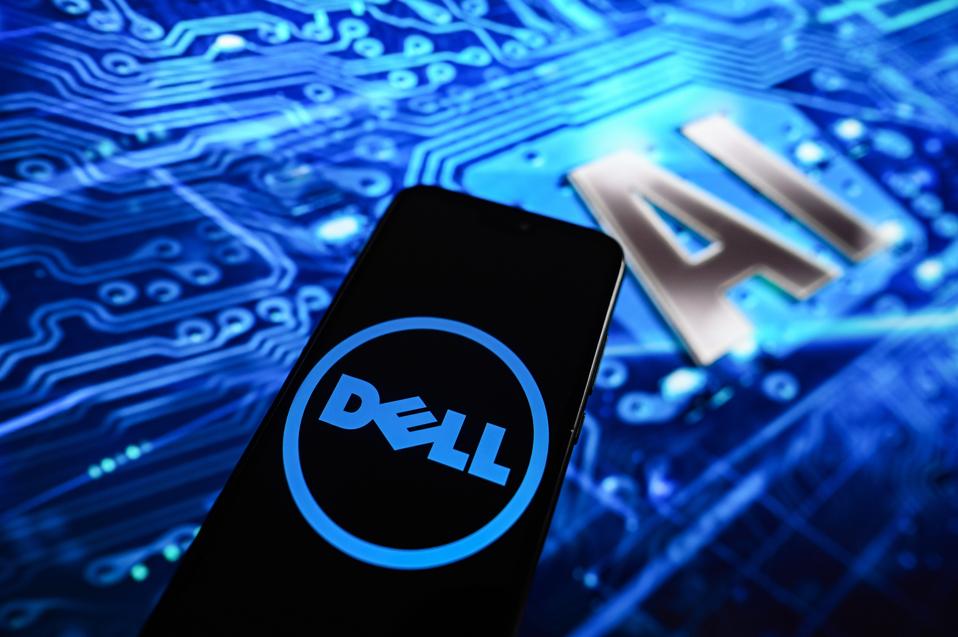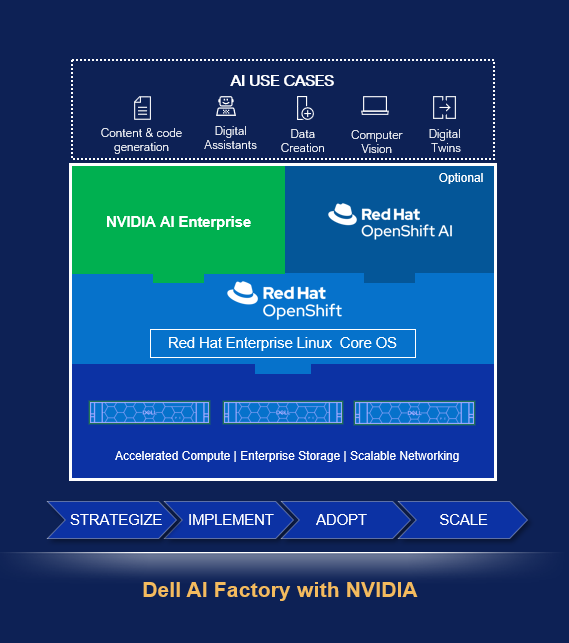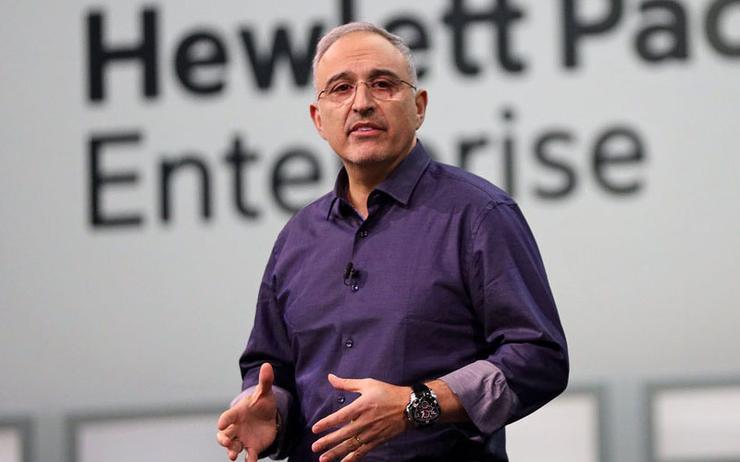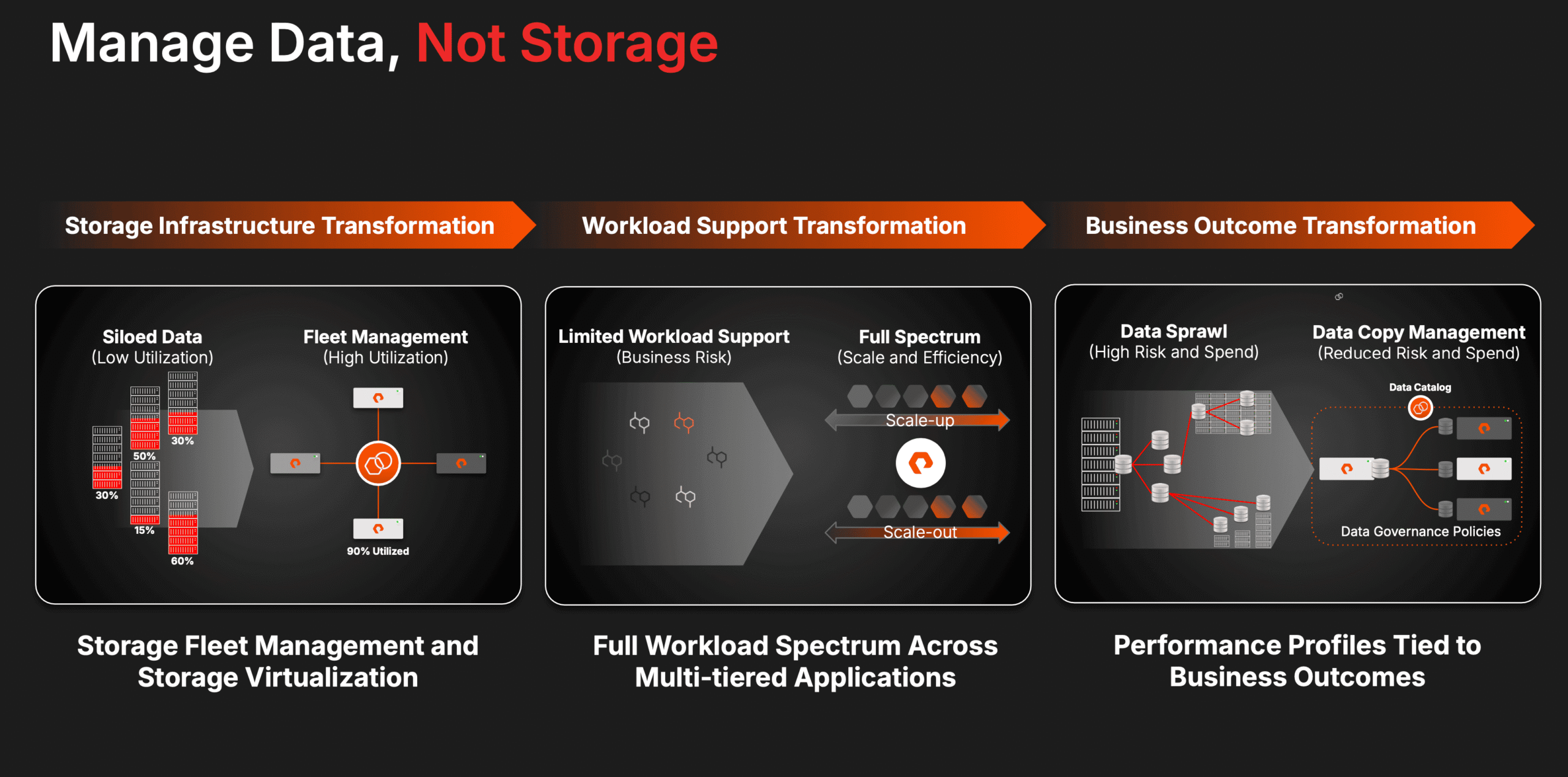Dell Technologies has made significant additions to its AI portfolio with its recent announcements at SC24 and Microsoft Ignite 2024 in November. The announcements span infrastructure, ecosystem partnerships, and professional services, targeting accelerated AI adoption, operational efficiency, and sustainability in enterprise environments.
Infrastructure Updates
Dell introduced two new PowerEdge servers as part of its Integrated Rack Scalable Systems (IRSS) program, aiming to meet the increasing demand for scalable and energy-efficient AI infrastructure.
- PowerEdge XE7740:
- Configurable with dual Intel 6th Gen Xeon CPUs.
- Supports up to 8 double-wide GPUs or 16 single-wide GPUs, accommodating a range of accelerators, including Intel Gaudi 3 PCIe and NVIDIA H200 NVL Tensor Core GPUs.
- Air-cooled chassis with thermal efficiency for high-performance GPUs, suitable for AI model inferencing and fine-tuning.
- Designed for rapid deployment with minimized integration disruption in existing data centers.
- PowerEdge XE9685L:
- Equipped with dual AMD EPYC 9005 CPUs.
- Supports up to 96 NVIDIA GPUs per rack, delivering a high GPU density optimized for AI and HPC workloads.
- Liquid-cooled design ensures efficient thermal management while maximizing compute power for demanding AI tasks.
- Dell Data Lakehouse Enhancements:
- Apache Spark Integration enables unified processing of structured, semi-structured, and unstructured data.
- Simplifies data processing, management, and analysis within a single environment.
- Dell APEX File Storage for Microsoft Azure:
- Combines Dell PowerScale storage with Microsoft Azure AI services.
- Facilitates seamless hybrid integration, enhancing scalability and native AI capabilities.
Professional Services
Dell launched specialized professional services that address skill and data challenges in enterprise AI adoption,:
- Data Management Services:
- Optimization of data pipelines and cataloging ensures AI-ready datasets, improving governance and model accuracy.
- Sustainability Services:
- Targeted at reducing energy and resource consumption in data centers.
- Advisory services offer tailored strategies for long-term efficiency improvements.
- Networking Design Services:
- Customized network architectures to support AI workloads, with an emphasis on scalability and integration.
- ServiceNow and Microsoft Azure Implementations:
- ServiceNow Now Assist and Azure AI Service implementations accelerate AI adoption by integrating GenAI capabilities into enterprise workflows.
Analysis
Dell is working hard to show that it can enable enterprise AI at scale. Its most recent announcements rally around the key themes of infrastructure flexibility, ecosystem integration, and sustainability. These themes address common enterprise barriers such as skill gaps, data challenges, and deployment complexity.
They also reflect several broader trends in the technology industry:
- Shift to Scalable AI Solutions: Enterprises are demanding solutions that simplify scaling AI workloads without sacrificing performance or energy efficiency. Dell’s high-density GPU racks and modular systems respond directly to this trend.
- Hybrid Cloud Optimization: Dell aligns with the growing demand for flexible AI deployment models by integrating seamlessly with Microsoft Azure and supporting hybrid environments.
- Focus on Operational Efficiency: Dell’s pre-integrated solutions, professional services, and reduced deployment timelines resonate with organizations aiming to minimize complexity and risk in their AI initiatives.
Dell’s moves in AI are intensifying competition with peers such as HPE, Lenovo, and Supermicro. Dell’s early support for the latest GPUs from Nvidia and AMD, along with its partnerships with industry leaders like Microsoft and Meta make it a key contender in the AI and hybrid cloud markets.
However, the company’s work delivering targeted solution stacks doesn’t always get the respect it deserves. Many people still perceive the company as a transactional box business. That’s an unfair characterization, as Dell’s expanding portfolio of AI products and services and the growing list of industry partnerships show its deep ability to deliver full-stack solutions for hybrid- and multi-cloud environments.
Dell’s strategy is paying off. In its most recent earnings, the company announced that its AI initiatives positively impact the bottom line. Dell said it sold $2.9 billion of “AI servers” in the most recent quarter and still has a backlog of $4.5 billion for the products. Its AI server demand pipeline grew by over 50% sequentially, belying the common wisdom that AI is a cloud-first play.
Dell has been the industry’s number one server vendor for as many years as most followers remember. Evolving from a server and storage provider to a full-stack AI solutions player isn’t easy, but there’s no OEM better positioned than Dell to do so.
The company continues to capitalize on the accelerating adoption of enterprise AI across while also managing to differentiate itself in the market. Dell has always been a critical partner for enterprise IT, something that continues as enterprise customers bring AI capabilities on-prem.
Competitive Landscape & Advice to IT Buyers
These sections are only available to NAND Research clients. Please reach out to [email protected] to learn more.





